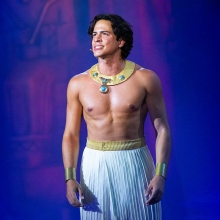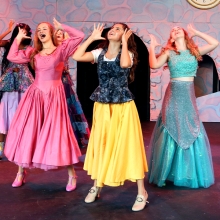Filichia Features: The Little Mermaid
Filichia Features: The Little Mermaid
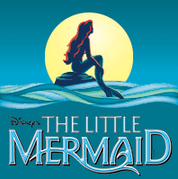
When the term "family show" is used, it's usually a euphemism.
What it more often means is a show that little kids will like or love. Mom and Dad, however, won't be as enthralled, but will get their enjoyment from seeing their tykes' beaming smiles and hearing their enthusiastic remarks.
And yet, The Little Mermaid is more appealing and valuable to adults than are standard-issue "family shows."
We have a genuine generational war going on here. Ariel, the title character, fiercely wants her independence as much as any teenager does. Her father, King Triton, is afraid to let her out into the big bad world she doesn't know, just as the parent(s) of any young daughter are. There's a good deal of protection that dovetails with love, but is there a point when that protection is too much?
"You're so unfair!" Ariel screams, delivering a line often used by children and too often heard by parents. Which teen can't identify with Ariel's lines "He doesn't understand me! He doesn't even try! I've never felt at home here. I don't fit in. I never have." Not only can kids relate to all that, but they'll nod their heads in recognition when Ariel arrives home later than her father expected or demanded and gets a severe lecture.
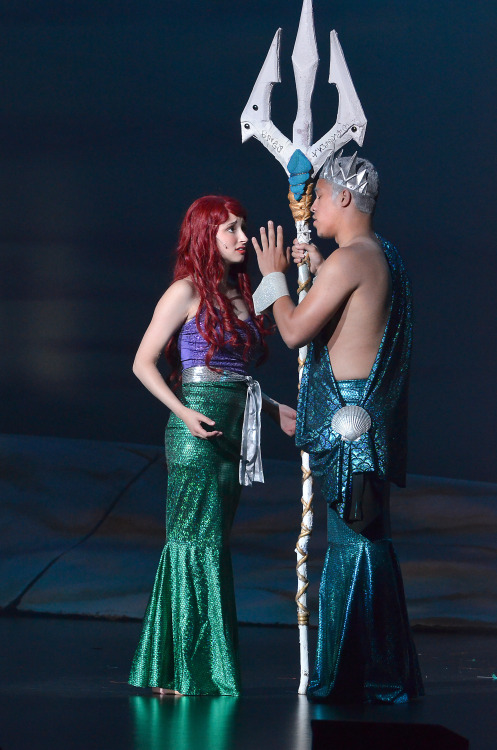
Bradford High School's Production of The Little Mermaid at the 2015 International Thespian Festival. (Photo © R. Bruhn)
Lest King Triton seem too autocratic, he is given one of the most powerful and yet sensitive lines found in any musical: "She'll learn to fear me, and I don't want that." Parents need to hear that, too.
The Little Mermaid plays fair with him. King Triton is right for not wanting Ariel up where the people are. They are indeed the enemy who routinely kill marine life as if it were their right and privilege. Considering that King Triton believes that his wife was caught and devoured by humans, he has every right to shield his daughter from these monsters who'd dole out the same fate to her.
As events play out, humans were not responsible for the death of King Triton's Queen; his evil sister Ursula was. The Little Mermaid reminds everyone not to rush to judgment, jump to conclusions or accept circumstantial evidence as anything definitive. Sad to say, some children and adults still need to hear and remember "You can't blame all humans for a few wicked ones."
Kids will also relate to when parents don't respect their possessions. Triton's ridding Ariel's lair of everything human may be more severe than a mother's throwing out her child's baseball cards, but it's in the same, you should pardon the expression, ballpark.
The Little Mermaid also offers one of the best "checkmates" in all musical theater. For when Ariel meets her Aunt Ursula, from whom the family has been estranged, she admits "Father says you're wicked and hateful!" Ursula blithely responds, "Mmmmyes! But he says the same thing of humans, doesn't he, snookums? And we both know that's not true, don't we?"
Checkmate! Ariel is convinced her father can't be right about the handsome and charismatic Eric, so she must at least entertain the possibility that her father isn't right about everything. He may not be, but he certainly turns out to be in this case.
All these points came through loud, clear and melodically in the recent production of the classic that Kenosha, Wisconsin's Bradford Theatre Arts Troupe brought to the Thespian Festival in Lincoln, Nebraska.
Do you question my use of "classic"? I'm not just referring to the story that Hans Christian Andersen wrote in 1837, but to the musical versions, too. While The Little Mermaid may seem too new to warrant that word, a quarter century has already passed since it began its musical life as the 1989 animated film by lyricist Howard Ashman, composer Alan Menken and screenwriters Ron Clements and John Musker. Although bookwriter Doug Wright and lyricist Glenn Slater helped augment it into the 2008 Broadway musical that we saw here in Nebraska, there's enough of the original property in it to grandfather-clause this version into the classic category.
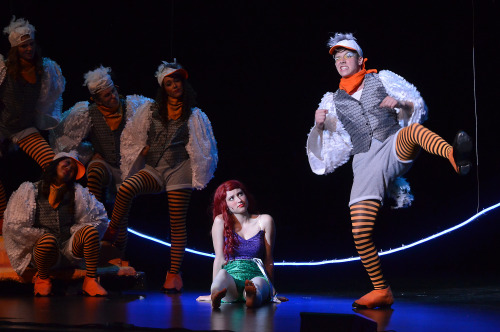
Bradford High School's Production of The Little Mermaid at the 2015 International Thespian Festival. (Photo © R. Bruhn)
What a clever solution set designer Jodi Williams had that saved a bundle of bucks. Two wavy tubes of neon that represented the sea spanned the stage. They would rise to the top of the proscenium for each scene that was set underwater and then were lowered to the bottom of the stage for every moment on land. It was such a simple solution, and yet it always let us know where we were. And when time came for a tempest, those bolts rapidly moved up and down.
Even so, $40,000 was required to take the show to Lincoln. Forty grand means quite a number of car washes, bake sales and just plain vivid entreaties to everyone from the Able Equipment Company, Inc. to such Kenosha institutions as its Rotary, Police Department, Yacht Club, Radiology Center and the city itself.
The money saved on aquatic scenery went to build the impressive boat. Girls flanked it and made swimming moves. Kids carried poles atop which sharks and turtles were placed. Hands manipulated Avenue Q-sized puppets of not just your average fish, but many a starfish and jellyfish as well. Electric eels were represented by a puppet head on a sleeve worn on each arm.
Performers representing humans, including the deft Sam Hailer as Prince Eric, dangled on ropes halfway between the proscenium arch and the stage. They twirled around so much that they would throw a whirling dervish out of whirl.
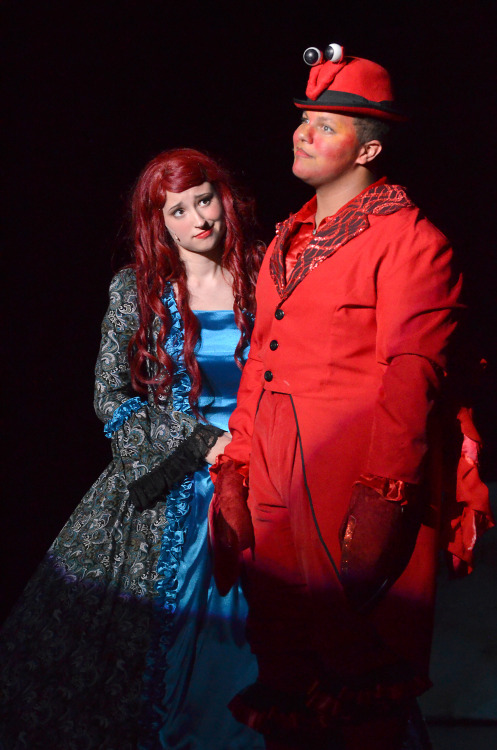
Bradford High School's Production of The Little Mermaid at the 2015 International Thespian Festival. (Photo © R. Bruhn)
At first glance, The Little Mermaid would seem to be less-than-ideal musical material. After all, a person whose voice is taken away cannot sing, right? No, she can - for the musical art form allows for a character to express inner thoughts. Ah, musicals! They seem to have solutions for everything!
It was a rare song that didn't get ear-splitting roars of approval. While the Menken-Ashman-Slater score has been universally known and cherished for some time, "Under the Sea" here held the distinction of being the one number that got cheers from the audience as soon as its vamp began.
"Under the Sea" was also the one song that got a standing ovation when it concluded. Of course it's the melody and lyrics that the kids love, but in a way, they were also cheering their childhood days when they watched a tape or DVD over and over again.
As it unfolded, I saw to my left a little girl standing and punching the air in time to the music. The irony is that the adult a row in front of me to my right was doing the same thing, albeit while staying seated.
See? A family show that's really for the entire family.
Sebastian literally got entrance applause -- meaning the character as soon as he was revealed in his red finery, for no one knew who actor James Booker was. Well, at least not yet; someday we may all be bragging that we saw him here when he was still a teen. Considering his immense talent, that fate is quite possible if not probable. Booker wasn't just a good song-and-dance man; he showed a genuine love for Ariel and an agonizing conflict on whether to be loyal to her or to his king.
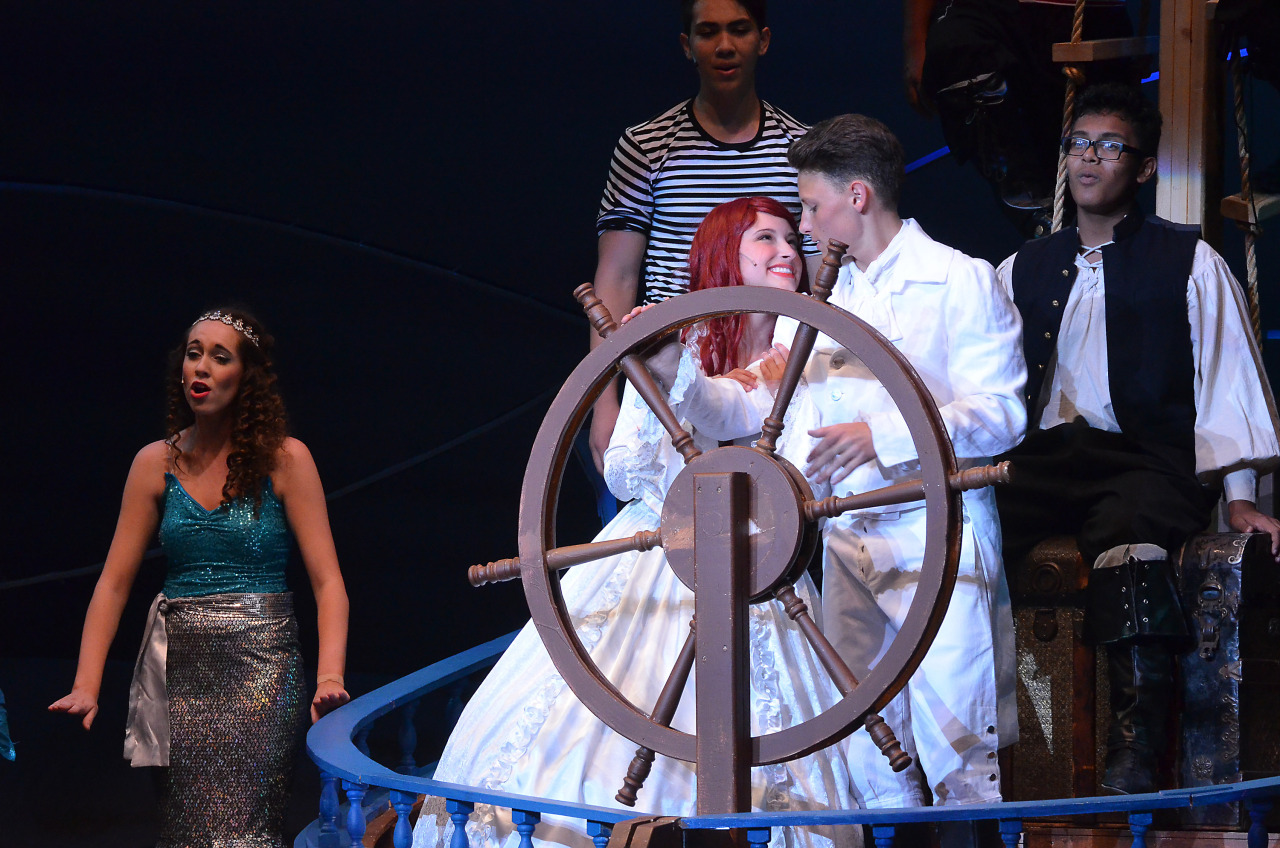
Bradford High School's Production of The Little Mermaid at the 2015 International Thespian Festival. (Photo © R. Bruhn)
But let's also give a nice shout-out to Mialee St. Peter's Ariel. By the time she exclaimed about the over-the-sea world that "This is where I belong!" we all knew that she belonged on the musical stage. When she got her new feet and was clad in a Miss America-worthy dress, she was aptly unsteady.
Meanwhile, Eric Danyus had the bass voice and gravitas for King Triton. And at the curtain calls, the kids wildly cheered Sidney Tisch for her Ursula. Less enlightened audiences would default to booing her just because she played the villain, but these kids wanted Tisch to know what a spectacular job she did.
I do have one final question. Why is Ariel called The Little Mermaid? Throughout the show, she certainly stands mighty tall. So does the property that Ashman, Clements, Menken, Musker, Slater, Wright and of course Hans Christian Andersen brought to us.
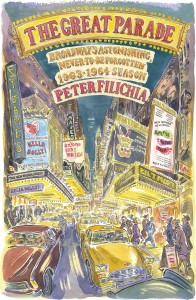
You may e-mail Peter at pfilichia@aol.com. Check out his weekly column each Monday at www.broadwayselect.com, Tuesday at www.masterworksbroadway.com and Friday atwww.kritzerland.com. His book The Great Parade: Broadway's Astonishing, Never-To-Be Forgotten 1963-1964 Season is now available at www.amazon.com.





















